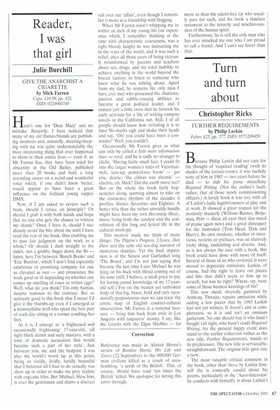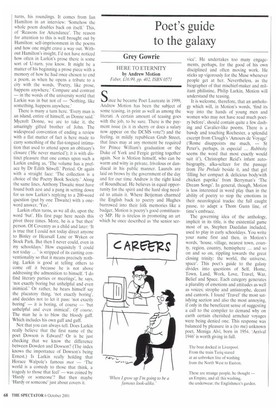Turn and turn about
Christopher Ricks
FURTHER REQUIREMENTS by Philip Larkin
Faber, £25, pp. 377, ISBN 0571209459
Bccause Philip Larkin did not care for the thought of 'required reading' (with its shades of the lecture-room), it was ruefully witty of him in 1983 — two years before he died — to dub his prose miscellany Required Writing. (Not the author's fault; rather, that of those newly commissioning officers.) A lovely book it was too, with all of Larkin's ludic lugubriousness at play and at work. It showed a great respect for the modestly masterly (William Barnes, Betjeman, Pym — these all earn their due meed of praise again now) and a great disrespect for the immodest (Tom Head, Dick and Harry). Its own modesty, whether in interviews, reviews or prefaces, was an elusively tricky thing, undulating and diverse. And, as is not always the case with a book, this book could have done with more of itself. Several of those of us who reviewed it were moved to deprecate omissions. Larkin, of course, had the right to leave out pieces and bits that didn't seem to him up to scratch, but was he right? Where, say, were some of those keenest keenings of his?
This new sheaf, shrewdly garnered by Anthony Thwaite, repairs omissions while adding a few pieces that by 1983 Larkin had not yet written. It doesn't aim at completeness, so it is and isn't an omnium gatherum. No one should buy it who hasn't bought (all right, who hasn't read) Required Writing, for the present happy event does stand to the earlier collection rather as the new title, Further Requirements, stands to its predecessor. The new title is serviceable, straightforward. The original title gave one a turn.
The most valuable critical comment in the book, other than those by Larkin himself (he is comically candid about his poems, particularly in the 'Auto-Interview' he conducts with himself). is about Larkin's turns, his roundings. It comes from Ian Hamilton in an interview: 'Somehow the whole poem doubles back on itself.' This, of 'Reasons for Attendance'. The reason for attention to this is well brought out by Hamilton: self-imprisonment in the poems and how one might crave a way out. Without Hamilton's insight, I'd not have noticed how often in Larkin's prose there is some sort of U-turn, you know. It might be a matter of his beginning a prose piece with a memory of how he had once chosen to end a poem, as when he opens a tribute to a city with the words. 'Poetry. like prose, happens anywhere.' Compare and contrast — in the words of the university world that Larkin was in but not of — 'Nothing, like something, happens anywhere.'
There is many a turn here. 'Every man is an island, entire of himself, as Donne said.' Mycroft Donne, we are to take it, the amazingly gifted brother of John. The widespread convention of ending a review with a flat matter of fact is here made to carry something of the flat-tongued intimation that used to attend upon an obituary's closure ('He never married'); it is with distinct pleasure that one comes upon such a Larkin ending as, The volume has a preface by Dr Edith Sitwell.' Period. Or again with a straight face: 'The collection is a choice of the Poetry Book Society.' Along the same lines, Anthony Thwaite must have found both zest and a pang in setting down for us now Larkin's replying to a 200-word question (put by one Thwaite) with a oneword answer. 'Yes'.
Larkin often turns, as we all do, upon the word 'but.. His first page here needs this pivot three times. More, he is a tut then' person. Of Coventry as a child and later: It is true that I could not today direct anyone to Binley or Hearsall Lane or Wyken or Stock Park. But then I never could, even in my schooldays.' How exquisitely `I could not today 'is stripped of its canting conventionality so that it means precisely nothing. Larkin is good at telling others to come off it because he is not above addressing the admonition to himself. `I do find literary parties or meetings', he says, 'not exactly boring but unhelpful and even inimical.' Or rather, he hears himself say the placatory thing, 'not exactly boring', and decides not to let it pass: 'not exactly boring' — it is boring, of course — 'but unhelpful and even inimical'. Of course. The man he is to blow the bloody gaff. Which includes his own gaff and guff.
Not that you can always tell. Does Larkin really believe that the first name of the poet Dowson is Edward? Or is he just checking that we know the difference between Dowden and Dowson? (The index knows the importance of Dowson's being Ernest.) Is Larkin really holding that Horace Walpole's famous mor — 'The world is a comedy to those that think, a tragedy to those that feel' — was coined by 'Hardy or someone'? But then maybe 'Hardy or someone' just about covers it.



































































































 Previous page
Previous page